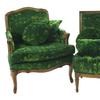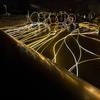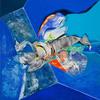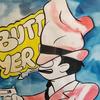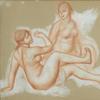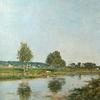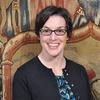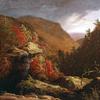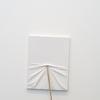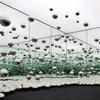500x334.jpg)
Heading Southwest [About Practice#2]
Cuchifritos Gallery + Project Space is thrilled to present Heading Southwest [About Practice#2], a group exhibition of recent work by Really Large Numbers (Chad Stayrook and Julia Oldham), Rebecca Howard and Katrina Neumann, curated by Alessandro Facente. Through a combination of video, site-specific installation and off-site performances, this exhibition introduces the work of three artists whose practices attempt to reveal the irrationality of our surrounding reality, leading the viewer to reflect on the concept of reality as a vision layered with hidden functions. The composition of the exhibition is intended to create the impression of totality for the viewer, manipulating various manners of perspective, scale and immersion. Thus, each in their own way, Really Large Numbers, Rebecca Howard and Katrina Neumann create fictional narratives and mythologies, by disrupting, manipulating and stretching the visual possibilities of the external stimuli around them. Using their dreams, various signs, sounds, printed texts, ordinary objects, as well as natural landscapes that populate their experience, each artist produces a phenomenon of expressions that are at once 'abnormal', ‘surreal’ and ‘magnificent’. The dreamy, musical performance Whale star by Really Large Number is exhibited in the form of a video documenting the collaborative’s first performance of the piece on September 22, 2014 at the Artists Alliance Inc studios for a restricted audience. For this installation, the video is over-sized, stretched beyond natural proportions, using this re-staging as a means to expand both the scale and access of the work beyond its original state; now taking place in a continuous loop within Cuchifritos Gallery, for an unlimited audience. In this piece, The Captain (Chad Stayrook) and Figurehead (Julia Oldham) sing a duet about their shared pursuit to capture each others individual perception of a whale seen in both the sea stars. The Captain is tracking a whale in the sea, while his ship’s wayward Figurehead has fallen madly in love with the navigational star Mira, a point in the equatorial whale constellation Cetus. By day, the Captain records a ship's log revealing his confusion and conflicting desires as his navigational efforts are mysteriously thwarted. When night falls and the Captain sleeps, the Figurehead undoes all of his forward momentum as she chases after her beloved whale star in the skies above. Also particular in size, though simple and intimate, is Rebecca Howard’s slideshow Channelling the Supernatural, an exploration into the nature of objects. The work combines both image and spoken narrative with the intent of changing how these ordinary objects might be perceived and imbue them a sense of the 'abnormal'. The series of objects focused on in the work are based upon a group of objects featured in the 2006 sci-fi television series 'The Lost Room'. The objects featured in the series were said to possess supernatural powers and able to induce supernatural happenings. Howard’s work probes the notion of everyday objects having the ability to behave beyond their static function and creates a narrative around this. In a more conceptual level, Katrina Neumann’s work is presented over time as a durational piece consisting of a series of Sunrise Tours around the Lower East Side (private apartments, roof tops, bridges, city streets etc.). Small groups of three to four people are invited to enjoy the rising of the sun through a structured, though undisclosed, itinerary of shared performative experiences. Their objective is to challenge one's unimpeded perception of reality, by framing a single detail--the sunrise--in order to induce a dislocated condition which forces a shift in our relationship between time and perceived space, as well as to experience of our everyday environment in all of its splendid beauty. While these tours will use the gallery space as a point of departure and continue off-site, the exhibition space will serve as an on-site extension of these external relational actions, a sort of ongoing archive which grows over time, collecting traces of documentation and participant impressions. The idea to gather together these specific works and cover topics of this kind comes from the history of the Essex Market itself. In 1940, a dedicated building was erected with the singular, and rational, objective to ease congestion caused by pushcart vendors that “crowded the city streets, making it difficult for police and fire vehicles to easily pass.” Over the years, this sort of tangible function of the Essex Market has been maintained, while also becoming more conceptual in its purpose thanks to its role as social aggregator, in addition to “its intended function as a shopping destination.” Using the market as both a geographic and ideological center, Heading Southwest [About Practice#2] aims to shed light on the macro meaning of the Essex Market’s inner and parallel social functions, as a metaphor of a universal need: the human desire to discover and find the irrationality within reality, the extraordinary within ordinary and the mythology within facts, in turn revealing a fragile desire to fictionalize reality by threading together a narrative that feels more impressive than the real. Perched at the southwesternmost point of the market, the Cuchifritos space seems to be the sublimation of this Essex Market’s inner function but, above all, the place where, exhibition by exhibition, a theory on this role is visually produced. So, its position in the Essex building represents an ideal direction, a metaphoric destination to go to, as well as a mythical geography that points the way to observe, interpret and follow the reality surrounding us. Heading Southwest [About Practice#2] is part of the large-scale curatorial project by Italian curator Alessandro Facente entitled About Practice, a series of group shows about ongoing studies and theories on the artist’s practice in relation to reality. As a chronological stratification of stories composed over time, the artist’s practice is can be understood as an argumentative substrate in its own right, which prompts the curator to critically outline the philology of the show starting from the topics which first arise from the artist’s practice itself. Such a joint approach of production and theory transforms About Practice into a series of exhibitions focused on the notion of concept, its role and position in the artwork as an intrinsic consequence of constant activity that develops its own theory as it unfolds.
- Contact:
- Jodi Waynberg
- jodi@artistsallianceinc.org
- 212-420-9202


